No one understands the power of real American history more than the right.
The shameless wars on “critical race theory” and “DEI” and “wokeness” stink of fear. It’s the fear of knowing that anyone who understands the true story of how Black America confronted relentless oppression by demanding that America fulfill its founding promise can’t help being both infuriated and inspired.
And no one has done a better job of telling real American history than Professor Carol Anderson. Her books White Rage, One Person, No Vote and The Second could be read as a trilogy of how America’s racist past has shaped our reactionary present.
We spoke to her about how the threats to democracy we face aren’t just named Donald Trump.
With humor, grace, and depth, she connects today’s attacks on voting rights led by names Ron DeSantis, Jeff Landry and Brian Kemp all the way back to the Mississippi Plan of 1874. And she also identifies how a lack of outrage at the right’s success at rolling back the gains of the Civil Rights Era helped lead to the crisis we face today.
********
TRANSCRIPT
Jason Sattler: One of the essential things about your work is it helps explain how America's past is always present. There's so many places where the backlash that we're seeing today is reminiscent to, at least to me, the end of Reconstruction.
I know we just talked about where you're hopeful, and I love that. Where are you worried about when, when you look across the United States?
Carol Anderson: One of the major places where I'm worried about is the Supreme Court.
We've got a Supreme Court that reminds me so much of the Supreme Court that we had coming out of Reconstruction. That Supreme Court that gutted basically the 13th, 14th and 15th Amendments and the Force and Enforcement Acts. And so those structures that were put in place to recognize African Americans basic U. S. citizenship, the U. S. Supreme Court gutted. And it took years of Jim Crow, decades of Jim Crow, and then a massive, powerful civil rights movement to try to reinstall what happened during Reconstruction. And I'm worried that we have a court right now that is dismissive of the basic Constitution and the issue of basic rights. And that they're more ideologically driven than legally driven. And so that is a major, major concern for me.
I'm also concerned about the doubling down on voter suppression techniques. One would think that after January 6th, after you saw these folks attack the U. S. Capitol to try to overthrow the government, to try to overthrow a free and fair election, that that would would give folks pause. But instead, in numerous states, we had a wave of voter suppression laws that looked at that massive turnout that happened by African-Americans, by Asian-Americans, by Latinos, and by indigenous Americans and said, "We have got to figure out how they access the ballot box, and we have to put more obstacles in front of them." And so that is a major concern for me, too.
And that looks so much like what you saw after Reconstruction.
Jason Sattler: The Brennan Center has just come out with a study and it could be called "Carol Anderson's book One Person, No Vote is exactly right." It looks at the racial turnout gap since President Barack Obama was elected, and it finds it has been growing since 2012, especially in the areas that had been once covered by the pre clearance sections of the Voting Rights Act. It's just a massive repudiation of the logic of gutting the Voting Rights Act, yet there's almost nothing in the mainstream press about this report.
There's a lot of talk about saving democracy, but not as much, except when you talk to Carol Anderson or Ari Berman, about voter suppression. What do you think is going on here?
Carol Anderson: I'm going to juxtapose the reaction that we saw to the Dobbs decision, the overturning of Roe, and the Shelby County v. Holder decision, which was the gutting of the Voting Rights Act.
With the overturning of Roe, you had this massive outcry. You had a massive realization that what you had here was the stripping of basic rights from women, the basic rights to control your own body. And rightfully so. But you didn't get that same kind of outcry with the evisceration of the Voting Rights Act with Shelby County v. Holder. Instead, it felt more kind of like, "Oh, that's just politics. Oh, that's just business as usual." And no, it's not.
Eviscerating the basic rights of American citizens to be able to access the ballot box is not something we need to be just, "Oh, that's just politics as usual." We have to understand what it really is. And part of that disconnect Is our inability to really recognize what voting does and what voter suppression does. I think the other component of that is that the proponents of voter suppression have been able to mask their heinous work under the guise of protecting democracy, stopping massive, rampant voter fraud, so-called "massive, rampant voter fraud."
By putting on that tape, "We are the defenders of American democracy. We're stopping all of this voter fraud from happening. That's why we have to shut down polling places where Black folks vote. That's why we have to require an ID in order to be able to vote. That's why we have to gerrymander these districts this way. Because we are protecting democracy," it gives a layer of protection and a kind of shield from the intense criticism that needs to happen in denying the right to vote to millions of American citizens.
I wrote the book One Person, No Vote after the 2016 election, because the pundits were saying, "Well,, you know, Black folks just didn't show up, you know. They didn't show up and they didn't show up because they couldn't stand Hillary." And so in that one sentence you had basically the racism and the misogyny linked together. So Trump was Black folks fault because Black folks just didn't show up.
But that was the first presidential election in 50 years without the protection of the Voting Rights Act. And so Black voter turnout went down by 7 percent. And to chalk that up to just, "They couldn't stand Hillary, and not that you had states that were now requiring really strict voter IDs, and the way that they were requiring these voter IDs was to figure out who had what types of IDs and then to write the law to privilege the kinds that whites disproportionately had. It was a way that they shut down early voting sites. It was the way that they shut down early voting days, the times when people could vote early. None of that went into that calculation of what could cause a 7 percent drop. It had to be because Black folks couldn't stand Hillary and not because you had states that were erecting these obstacles, these barriers, to the ballot box.
Jason Sattler: So that's really interesting. You say "the guise of defending democracy." Right now, we're seeing a lot of the guise of they're attacking Critical Race Theory or they're attacking DEI, or they can't say certain words so they use "wokeness" to describe what they're attacking.
And this is turning into policy in a shocking number of places. And for instance, Alabama this week, where they're going to ban any speaker who talks about critical race theory, which almost seems like they're banning a specific race of academic to speak on campuses in Alabama. Is this cloaking your racist effects in "defense of American values" consistent throughout American history?
Carol Anderson: It is consistent. This is what we saw when the Confederacy was talking about what they were doing was protecting "the Heritage," protecting basically what was in the Constitution. This is what we saw with with the massive disenfranchisement that happened in Mississippi in 1890. It was to end corruption at the ballot box and to protect American democracy when what it really was about was how do we remove Black men from having access to the ballot box.
In 1890, there were 190,000 Black men registered to vote in Mississippi. By 1892, two years after the massive disfranchising Mississippi Plan, it was 8,600. So to go from 190, 000 to 8,600. And then you have the Supreme Court, who looked at the Mississippi plant looked at the literacy test, and the poll tax and said they don't violate the 15th Amendment because the 15th Amendment says the right to vote shall not be abridged on account of race, color, or previous condition of servitude. And you have that Supreme Court looking at what Mississippi had just done and say, "Well, it's not discriminatory because everybody has to pay the poll tax. And it's not discriminatory because everybody has to take the literacy test." But everybody did not have centuries of slavery in their legacy, centuries of slavery.
And so when you have Alabama talking about, you can't talk about Critical Race Theory or you can't talk about DEI, you can't talk about race... I mean, this is Alabama, where you had Selma, where you had to have folks who were dying to be able to vote. This is Alabama where you had. massive plantations. This is Alabama that was one of the leaders in the Civil War, in the Confederacy in terms of fighting the United States in order not just to maintain slavery but, in fact, to expand it westward. That is what the Confederacy wanted.
So it basically means you cannot teach real American history. That's what that means. Because real American history, it reveals how essential racism and anti-Blackness was to the development of this nation. And if we don't understand that, then we're going to keep replicating the same problems over and over again. And we're going to have policies that don't deal with how we got here.
Jason Sattler: One of the areas of real hope in 2020 was Georgia. It seemed like it was on the verge of bursting through and becoming the new Georgia that everyone had been talking about for a while and quicker than anyone expected. Since then, it seems like there has been... I guess "backlash" would be a good word to describe it. You are in Georgia right now and you're living it. There's good going on in Georgia and then there are definitely signs of attrition.
What do you think is happening in your state?
Carol Anderson: I think part of what happened. We have to go back to 2020 and you had enormous pressure being put on Republicans on Brian Kemp and on Brad Raffensperger as Secretary of State to overturn the election to overthrow the results of the election. And they said, "No, we're not going to do that."
What that did was it allowed those Republicans, like Kemp, like Raffensperger, to look like moderates, to look like sane Republicans, which was something that was just almost like looking at a unicorn, right? So that ability to look sane and reasonable, when in fact what you're proposing is massive disenfranchisement.
I think that that's part of what happened was that, again, the guise of reasonableness coming out of Kemp and Raffensperger, when in fact, what you're really seeing is, remember, Kemp immediately signed that, that SB202 in a room full of white folk underneath a picture of a plantation. Yes, yes.
Jason Sattler: And that's the bill that, for instance, says that you can't bring water to someone when they're waiting in line to vote.
Carol Anderson: Yes, yes. And, and when you think about it where the long lines are, the research is really clear. In precincts that are 90 percent Black, they have to wait 10 times as long as in precincts that are 90 percent white, and that is because the bulk of the polling places that Georgia shut down were in minority, in Black areas and in poor areas. But that is where the increase in voter registration is happening. So if you have more people but fewer polling places, then that increases the lines.
So when you have a statute that reads, you cannot provide water and food for people in long lines, what it basically means, we know we have created those long lines in Black precincts.
Jason Sattler: Right.
Carol Anderson: You cannot provide water and food to folks who are in those precincts where that are predominantly African American.
Scarlett 2i2 USB-4: I know a little bit about cybersecurity, and this sounds like a denial of service attack. You open up the poles, you flood them. And statistics show, when you see a line, a lot of people go home.
Carol Anderson: Yes. I mean, it's, it's so logical, right?
People have different experiences. So if you're in a predominantly white area, you go in and you vote. Okay. You're in and out in a few minutes. If you're in a predominantly Black area, you've got these long lines.
And so when you hear about these long lines of people being frustrated by the vote, you're like, "Why? I got in and I voted immediately. I don't understand why you just..." Again, this is what this is designed to do. It's designed to create a disparate impact, which creates a disparate experience, which leads to voter suppression, which leads to voters just being frustrated.
Because Trump is such a clear and present danger to democracy, you have had what we had in 2020. You've had folks who are standing in line for hours. In Cobb County, which is part of metropolitan Atlanta, the lines in the Black community were like, somewhere between 10 to 12 hours long and people being willing to stand in line to vote because they knew democracy was on the line. When we require that kind of of exertion of will, it is unconscionable.
But it gets cloaked in terms of, again, "We're protecting democracy" or cloaked in terms of being fiscally responsible. You want your government officials to be fiscally responsible, right? So having all of these polling places open, it requires money to staff them. It requires money to put the machines there. Da da da da da da da da da. I mean, this is the stuff you hear over and over and over again to cloak the attack on democracy, to cloak the attack on American citizens' ability to vote.
Jason Sattler: It's always been shocking to me, how little evidence there is to back up the need for voter suppression, given all the evidence of the harms of voter suppression, the history of voter suppression. It's easier to find someone who was hit by lightning on Election Day than it is to find someone who showed up to impersonate another voter. Just because it's so hard, and the risks of stealing one vote are tremendous. Imagine stealing thousands.
Carol Anderson: Right. I think about Justin Levitt's study. Between 2000 and 2014, there were 1 billion votes in America, 1 billion. And there were 31 documented cases of voter impersonation fraud. So, 31 over 15 years out of 1 billion. That becomes the foundation for this lie of massive rampant voter fraud.
But we have a nasty, nasty history of using the lie of voter fraud as a way to to to create these policies that block the people we don't want to have access to the ballot box. That's what the literacy test was designed to do. And that is what the poll tax was designed to do. That is what the "Understanding Clause" was designed to do. That is what the "good character" clause was designed to do. That is what felony disenfranchisement is designed to do. So when you have a criminal justice system that that skews towards identifying African Americans as inherently criminal, those are the ones you lock up, and then you have these felony disenfranchisement laws, then you're able to link the criminal justice system with the systematic denial of the right to vote.
We've seen that pattern over and over and over.
Jason Sattler: You're leading to a question I had about someone else who could make Brian Kemp look moderate and that's Ron DeSantis, perhaps. Something I want to yell out the window to anyone who will listen is "Ron DeSantis has disenfranchised with a signature more people than anyone alive." Maybe John Roberts has. It's a tight race. But one reason I don't want to point this out too much because I might make Republicans like Ron DeSantis again.
What do you see that's going on in Florida?
Carol Anderson: Let me do a bit of history.
In 1867, Congress passed the Reconstruction Act. That basically said that Black men could vote. In 1868, Florida passed permanent felony disenfranchisement. So one year after the Reconstruction Act, Florida passes permanent felony disenfranchisement that says that if you commit these crimes, then you will no longer have your voting rights. The crimes that they identified are the ones that they targeted on African Americans. And so by the time we get to 2018, in the U. S. there were 6. 1 million folk who could not vote because of a felony conviction, 1. 7 million of them were in Florida alone. So 1. 7 million in that one state under permanent felony disenfranchisement.
And then there was Amendment 4, which was a ballot initiative that basically allowed people to have their voting rights back. Over 60 percent of Floridians voted for this thing. The legislature clutched his heart and went, "Oh no, we can't have that." Because what that disenfranchisement meant was that 40 percent of adult Black men in Florida could not vote because of a felony conviction. And over 20 percent of African-American adults in Florida could not vote. And given the way that race is aligned with party in the U. S., that Republican legislature looked up and said, "Oh, no, we're not giving all of these folks their voting rights back. We know that this was a ballot initiative. How do we change this? How do we make this work for us?"
So part of that was to change the language to say that completing your sentence actually means not only have you served your time, but you have paid all of your fines, fees, and court costs. And so folks looked at that and said, "Lord, that looks like a poll tax, because I'm not required to pay my income tax to be able to vote. I'm not required to pay my property tax. But now I gotta pay fines, fees, and court costs to be able to vote. That looks like an unconstitutional poll tax."
And so this went up to the federal courts and the court ruled that it was the worst of both worlds. "No, this is not a poll tax. And so you must pay your fines, fees and court costs to be able to vote. And Florida doesn't have to tell you how much you owe."
So imagine being in this really Kafkaesque world, right? It's vintage literacy test. Back in the day, the registrar could ask you, "How many how many bubbles in a bar of soap?" could ask you an absolutely unanswerable question.
Mr. L, who was part of the village who helped raise me, he came out of Jim Crow, Georgia. His literacy test question he said was, "How high is up?"
When you go to pay your fines, fees and court costs, Florida can basically ask you how high is up because it is an unanswerable question because Florida is not required to tell you how much you owe, but they can block you from voting because you haven't paid how much you owe. That's where we are with Florida right now.
Jason Sattler: Literal SWAT teams were sent to people's homes who had voted, some who had a letter that said you could vote. How much state intimidation is built into the history of voter suppression?
Carol Anderson: Oh, it is knee deep. It is so there.
During Reconstruction, you had the rise of the Ku Klux Klan, the rise of the White Camellias, the rise of the Redshirts, the rise of this white domestic terrorism apparatus that would really hound African Americans. They would also do it to white folks who believe that African Americans were really American citizens. And so you had white domestic terrorists intimidating, killing, harassing Black people and doing the same to whites, basically policing whiteness .
So when you think about DeSantis coming up with millions of dollars for the "election integrity" security force and how they brought the cameras as they were arresting people... These were arrests that were designed to be put on television during the news so that people could see this is what happens when you vote. And what you saw was that they were consistently arresting, arresting African Americans. That's what you saw on those screens, and people being absolutely bewildered going, "Why am I being arrested? For voter fraud? For voter what?" And just looking like you're going back into that system again is enough to send fear through that larger community.
Judges have, have just basically thrown out those cases going, "There's no there there." But that's not what, that's not what gets recorded. What gets recorded is that you have African Americans arrested for voting, even when they have the letter from the registrar's office saying, "You can vote. Here's your voter registration card. You can vote. The state's like, "No, no, no, not at all. In fact, what we're going to do is we're going to make an example of you." And it's that same kind of intimidation that Georgia did in the 1946 gubernatorial election, where Eugene Talmadge, Eugene Talmadge, who was running for governor, And he was running on a platform, put the Negroes back where they belong. And that platform also dealt with trying to re institute what the Supreme Court had just banished, which was the white primary. And they had these, these folks at the polling stations to systematically intimidate, to challenge African Americans. " Are you sure you're eligible to vote? Really? Really? Prove it. Prove it. Prove it." And remember, this is Jim Crow Georgia, and you had a wave of lynching happening in 1946. You had a horrific quadruple lynching in 1946. You had the killing of Maceo Snipes, who dared to vote in Taylor County, Georgia, in 1946.
With the violence that is steeped In the system and with whites and going after Black folks who are trying to vote, that intimidation is real. And this is again what DeSantis is using with this task force this security force that he is he is rigged up.
Jason Sattler: You made this note about how quickly after the Reconstruction Act that Florida went disenfranchising people primarily based on race. I see what's happening in Louisiana where there was a Democratic governor for eight years and within months, the new Republican governor Jeff Landry has instituted a series of laws that you could only say are reminiscent of Jim Crow, because it's all about criminalizing blackness. That may be my simplification of what's going on. My fear is I think people don't understand is how quick this contagion can spread or how fast this can happen.
Am I being paranoid?
Carol Anderson: Not at all. Not at all. So, again, I say the Mississippi Plan was 1890. Right. You had South Carolina coming back in 1894 and, and developing the white primary. You had the U. S. Supreme Court in, in 1898, basically with the Williams decision, blessing on high the literacy test and the poll tax. Right after that, you had the coup in Wilmington that overthrew a fusion government that overthrew a government, an elected government of African Americans and whites, and just a few years after that, you had a Constitution being put up in North Carolina that disfranchised the Black population overwhelmingly. You had the same thing happening in Alabama in 1901. You had the same thing happening in Georgia after the Atlanta race massacre, a new Constitution that disfranchised African Americans in 1908. So it doesn't take long once they realize, "Oh, this is the formula, this will work. And this gets approved on high. This becomes acceptable. This becomes what is legal. So as long as we stay within the legal boundaries, We can stop American citizens from voting. And we can do it in ways that that looks like it's legal. In fact, when we know it's not."
So you had "Big Chief" Jim Vardaman out of Mississippi saying, "Okay, why evade? The whole point of redoing our Constitution was to keep the out of politics." So he's really clear. "This is why we're doing it. It's to keep them away from politics. It's to keep them away from the ballot box. Keep them from being able to vote. That's why we're doing this." But again, you had the courts going, "Yeah, that's fine. That's fine." And so you had the poll tax being in place until 1964 with a constitutional amendment.
Mark Twain apocryphally said, "History may not repeat itself, but a show do rhyme." What we're dealing with right now are the rhymes. We're dealing with the rhymes. We're dealing with the fear, the fear of an increasingly diverse America and what that increasingly diverse America could mean for the politics, for the culture, for the strength, for the resources, the resource allocation in this nation.
That's the same thing we saw in Mississippi in 1890 because there were more Black men registered to vote than white men. That became a problem. That became a problem that had to be solved with massive disenfranchisement. In North Carolina in 2012, you had higher Black voter turnout, then you had white voter turnout. The response from from North Carolina was something called the "monster" bill. And so the "monster" bill limited the amount of days for early voting. It provided for voter ID. It shut down the number of early voting places. It ended pre-registration for 16 and 17 year olds. it did all sorts of things to try to figure out "How do we stop all of these folks from voting? How do we make sure that the only people that we want to have access to the ballot box can have access free and unfettered access to the ballot box while we're putting up these barriers for everybody else?"
And so, and when you think about it, Shelby County v. Holder. That was in 2013. Two hours after that decision, Texas implemented a racist voter ID law. Alabama soon came behind them. North Carolina. I mean, it was just boom, boom, boom. So, these things spread like contagions. It is, it is like, it's the playbook. And once they see that the playbook will work, that the playbook can go through the U. S. Supreme Court. It is like, "This is how we do it."
Jason Sattler: This is another aspect of the playbook that I'm starting to get scared about that I hadn't really thought about before is this idea of limiting freedom of movement which comes back to in the end of your book, One Person, No V ote, you discuss " half slaves, half free. " It's very reminiscent of slavery area, but this is coming in terms of Texas wants to enforce its own immigration law. Lots of red states want to limit the the ability of anyone can get pregnant from traveling outside of the state. And if you are in the legal system, your movement is limited.
Is this new frontier of this, or is this the old frontier?
Carol Anderson: Limiting movement is as old as the pre-United States.
When you look at the Slave Codes, it was about fear that Black folks going from one place to the other. Being unfettered would create chaos, which is a source of danger that would upset, upturn, destabilize the system that was being put in place. And so that allowed the slave patrols to go, "Where are you going? Let me see your papers. Prove you are who you are. Prove you are supposed to be here."
When you think about the law coming out of Lubbock, Texas that women on the road can be stopped. I was like, so what are you going to do? Stop every woman and make her take a pregnancy test? I mean, what are you doing? I mean, but also think about SB4 out of Texas, which was the one that the Supreme Court had said that allowed women officers to basically stop what they consider to be illegal immigrants. Well, how are they going to know they're illegal immigrants?
But we know that they're doing it by race. They're doing it by saying, "Okay, you're brown. You're automatically suspect. That's like the Fugitive Slave Law of 1850 that allowed slave catchers to go north and say, "If you're Black, you're going to have to prove you're not a runaway slave. So we're going to be able to haul you back down south and and put you on a plantation and work you for free." You have free Blacks being hauled into that system because there was the automatic assumption that if you're Black, you must be enslaved. And it's that same thing that they're doing with immigration. That if you're brown, you must be an "illegal" immigrant. So, you know when they talk about illegal immigration when they talk about we're rounding up immigrants, they don't mean the folks that that Donald Trump has married. That's not their vision of an immigrant, right? Their vision of an immigrant is somebody who is Latino. That is an immigrant. It is somebody who is Haitian. That is an immigrant. And so you begin to see how racialized this, this notion of criminalizing immigration is and how it can lead to the kinds of, of atrocities that the Fugitive Slave Act led to, where people were getting rounded up and, and put into slavery.
So these rhymes are there. These, these are the patterns. So this is why Alabama is banning the teaching of real American history. When we don't know our history, then this looks reasonable. This is not reasonable. It leads to really bad, bad things. It has horrific consequences.
Jason Sattler: We only have a couple of minutes left of your time and, and I just have to remind myself over and over again that the question "What would American fascism look like?" It would look a lot like the past...
Carol Anderson: Yes.. I recently gave a paper at the American Historical Association. The question was, "Is fascism coming to the U S ?"And I said, "We've already had it."
That is what the Jim Crow South was because you had a one-party system. You had your strong men. You had the systematic denial of the right to vote. You had an appreciation of, a valorization. of extra legal violence, of terrorism that rained down on folks. You had the gutting of education happening there. So that schools that were trying to teach a certain kind of curriculum. "We're not having that." And schools that had active students, they were being threatened with having their funding taken away from them, state funding taken away from them.
So when you're looking at what's happening with education, when you're looking at what's happening in the political system, when you're looking at the acceptance of violence, and you had people being put in power that only had a voter turnout rate of like 7%. That's Putin-esque, right? That is what a fascist system looks like. It looks like people being able to rule in a so-called democracy where you don't really have democracy.
Jason Sattler: That is a scary but profoundly important note to end on. Professor Carol Anderson, thank you so much for your time and the history lesson. It is what America needs right now.
Thank you so much for having me.
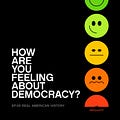


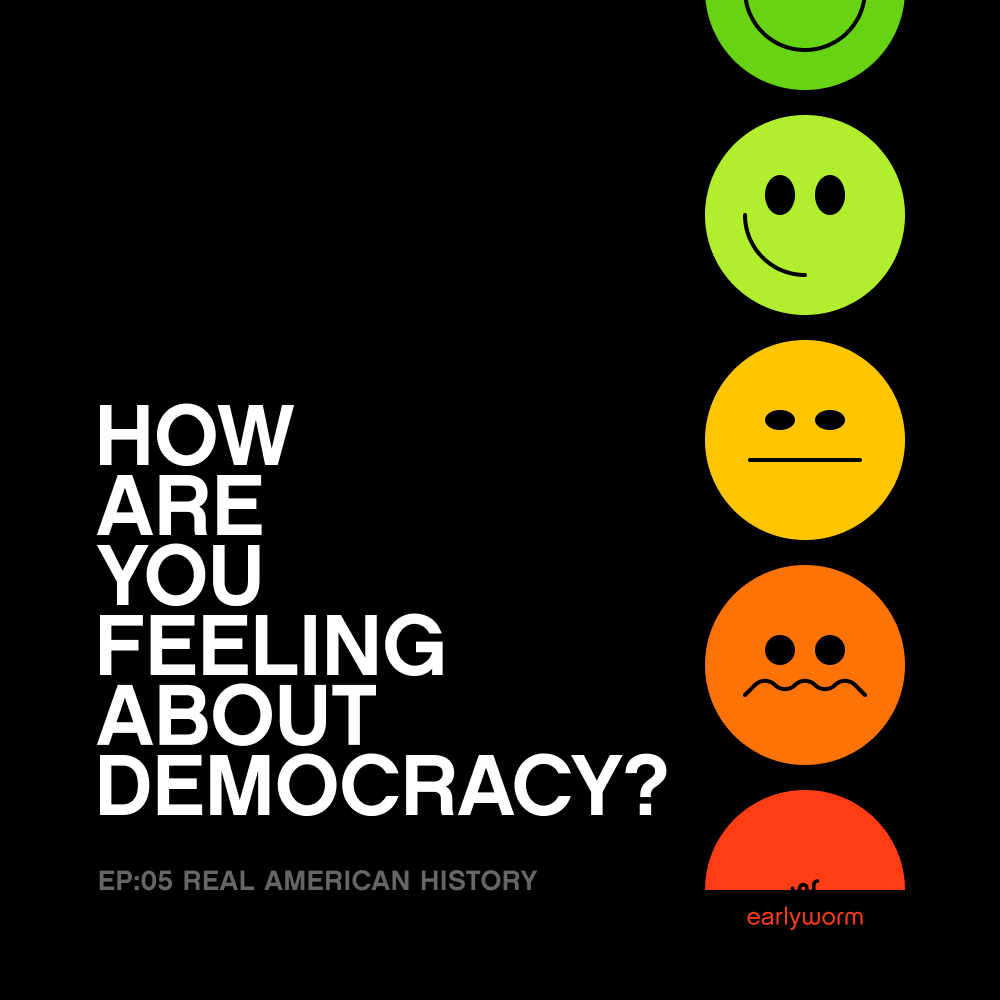


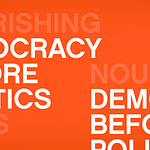
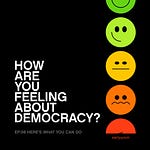

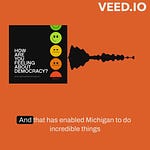
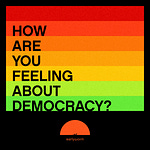
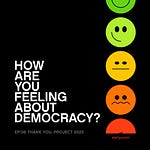

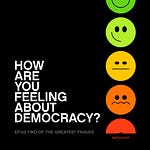
"Real American History" with Carol Anderson